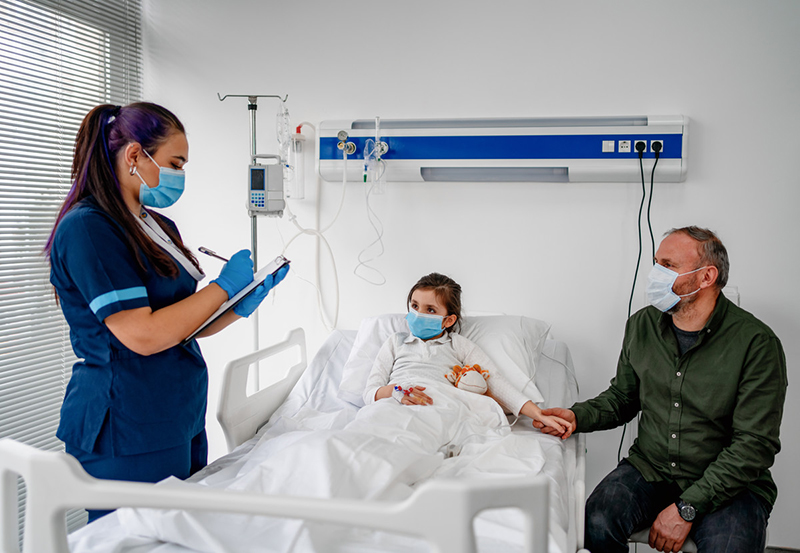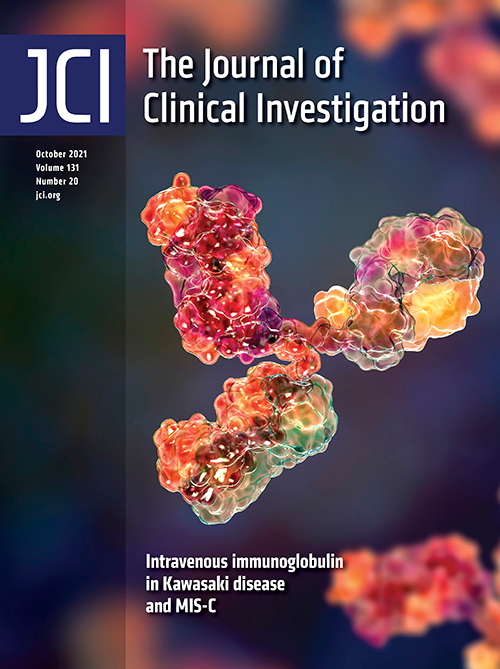NIH-funded study explains how intravenous immune globulin helps children with rare COVID condition

WHAT:
Intravenous immune globulin (IVIG)—a common treatment for multisystem inflammatory syndrome in children (MIS-C)—likely works by depleting immune cells called neutrophils, according to a recent study funded by the National Institutes of Health (NIH). MIS-C is a rare condition that usually affects school-age children who initially had only mild COVID-19 symptoms or no symptoms at all. The researchers also found that IVIG works in a similar manner for treating Kawasaki disease, another rare inflammatory condition that affects children and shares symptoms with MIS-C. The findings are published in the Journal of Clinical Investigation.

Credit: Image courtesy of JCI and copyrighted by the American Society for Clinical Investigation
MIS-C is marked by severe inflammation of two or more parts of the body, including the heart, lungs, kidneys, brain, skin, eyes and gastrointestinal organs. Its symptoms overlap with Kawasaki disease, and treatments for MIS-C are guided in part by what is known about treating Kawasaki disease. IVIG, which is made up of antibodies purified from blood products, is a common and effective treatment for heart complications caused by Kawasaki disease. For MIS-C patients, however, IVIG alone does not always resolve symptoms, and healthcare providers may need to prescribe additional anti-inflammatory drugs.
To better understand how IVIG works and to improve treatments for children with MIS-C, researchers led by Ben A. Croker, Ph.D., and Jane C. Burns, M.D., from the University of California San Diego School of Medicine, profiled immune cells from patients with MIS-C or Kawasaki disease. The team sampled cells before treatment began as well as 2 to 6 weeks after patients received IVIG. The researchers found that neutrophils from these patients were highly activated and a major source of interleukin 1 beta (IL-1β), which is one driver of inflammation in the body. After IVIG treatment, these activated neutrophils were significantly depleted in patients with MIS-C or Kawasaki disease.
According to the study authors, their findings are the first to explain why IVIG is effective for both conditions. However, more work is needed to understand how IVIG causes cell death in these activated neutrophils and why certain patients with MIS-C require additional anti-inflammatory treatments. Overall, the research will help healthcare providers as they determine the most effective methods to treat patients with MIS-C.
The study is funded by NIH’s Eunice Kennedy Shriver National Institute of Child Health and Human Development (NICHD), the National Heart, Lung, and Blood Institute (NHLBI), and the National Institute of General Medical Sciences (NIGMS). The work is supported by NIH’s CARING for Children with COVID, PreVAIL kIds and RADxSM-rad research programs.
WHO:
Rohan Hazra, M.D., acting director of NICHD’s Division of Extramural Research, is available for comment.
ARTICLE:
Zhu YP et al., Immune response to intravenous immunoglobulin in patients with Kawasaki disease and MIS-C. JCI DOI: 10.1172/JCI147076 
###
About the Eunice Kennedy Shriver National Institute of Child Health and Human Development (NICHD): NICHD leads research and training to understand human development, improve reproductive health, enhance the lives of children and adolescents, and optimize abilities for all. For more information, visit https://www.nichd.nih.gov.
About the National Institutes of Health (NIH): NIH, the nation's medical research agency, includes 27 Institutes and Centers and is a component of the U.S. Department of Health and Human Services. NIH is the primary federal agency conducting and supporting basic, clinical, and translational medical research, and is investigating the causes, treatments, and cures for both common and rare diseases. For more information about NIH and its programs, visit https://www.nih.gov.

 BACK TO TOP
BACK TO TOP